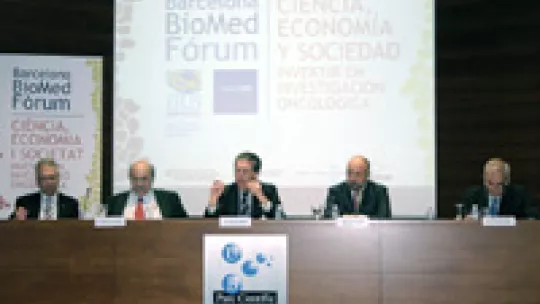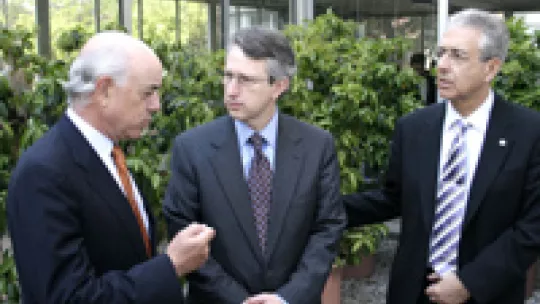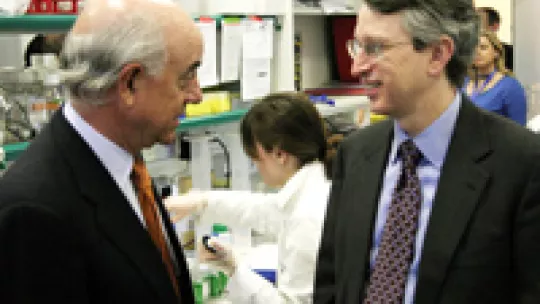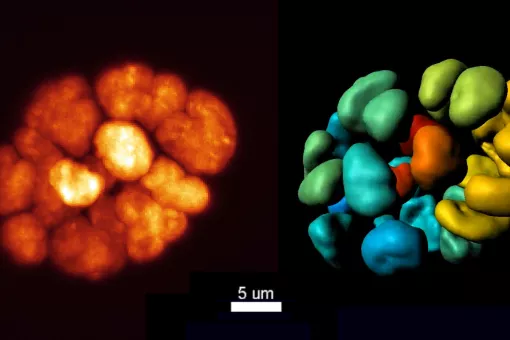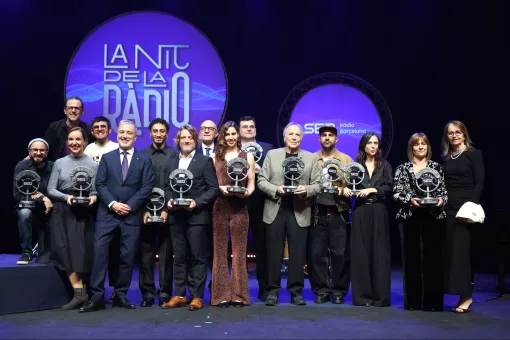Images
Big business, represented by Francisco González, president of the Fundación BBVA, and science, represented by Joan Massagué, adjunct director of the Institute for Research in Biomedicine (IRB Barcelona) met today at the Barcelona BioMed Forum, “Science, Economy and Society: invest in cancer research,” to discuss the future of cancer research and the role that big business can play in advancing biomedicine. The event, which took place in the Antoni Caparrós auditorium of the Barcelona Science Park (Parc Científic de Barcelona) was inaugurated by the Government of Catalonia’s Minister of Health, Marina Geli.
In conveying the Government’s enthusiasm to participate in the Forum, she reminded delegates about the important role that biomedical research plays in Catalonia. After talks by Massagué and González, the Forum continued with a round table discussion, in which José Navas, director of the Biomedical Research Plan (Pla de Recerca Biomédica) of the Department of Health of the Government of Catalonia, Andreu Mas-Colell, chair of Economics at the Universitat Pompeu Fabra (UPF), Federico Mayor Zaragoza, president of the Initiative for Science in Europe (ISE), and Francisco González-Robatto, president of the Spanish Cancer Association (Asociación Española contra el Cáncer -AECC) participated.
Massagué: "Scientific, technological and medical expertise must be put together to create powerful, integrated nodes across the globe.”
The strategy of modern research
Joan Massagué, internationally recognised cancer expert who has made pioneering contributions to understanding the basic mechanisms of cancer and metastasis, demonstrated how a global approach should be used for cancer research, using his studies on the how defects in certain genes can cause metastasis as an example. In clear and understandable terms, he explained how his research led to the discovery of genes that cause breast cancer to metastasise.
Massagué noted that in order for the promises rising from research in laboratories to be converted more quickly to tangible benefits, a closer relationship between basic research labs, clinical experts and the pharmaceutical industry is needed. “This is the strategy of modern research,” said Massagué, “laboratories cannot work in isolation. Scientific, technological and medical expertise must be put together to create powerful, integrated nodes across the globe.”
Massagué recently published an important study, completed in his lab at the Memorial Sloan Kettering Cancer Center in New York, in which he identified four genes that cause breast cancer to metastasise to the lung. He noted that Barcelona provides an ideal setting for this type of collective research. He has promoted the establishment of a Metastasis Laboratory (MetLab) at IRB Barcelona, the institute of which he is also adjunct director. “Laboratories such as this one,” he says, “needs to have porous walls so that its research can mix with that of other institutes, thereby taking advantage of all scientific and technological expertise available.”
González: "We must mobilise business to support the major causes of our time."
The president of the Fundación BBVA, Francisco González, identified research such as that of Massagué as an example of the type of activity with which the Fundación BBVA identifies: teamwork that leads to knowledge and that responds to societal concerns - and whose success will have repercussions at many levels. “We work towards a better future for society,” says González, who announced during the Forum that the Fundación BBVA will extend their support of research and related activities at IRB Barcelona from three to five years. González maintained that “we must mobilise business to support the major causes of our time; the BBVA Group and its Foundation have taken on this challenge because we believe that contributing to the development of models of excellence in research leads to many benefits, including greater collaboration of the private sector in these activities.”
Invertesting in cancer research is beneficial for all
During the round table discussion, “The impact of cancer research”, José Navas, director of the Biomedical Research Plan (Pla de Recerca Biomédica) of the Department of Health of the Government of Catalonia, noted that the exceptional quality of the hospital system in Catalonia and Spain, and the increasing orientation toward applied research of universities and public research centres is leading to better quality cancer research. He placed Catalonia at the forefront of the Spanish provinces in this area.
Navas: “The emphasis is on organizing programmes that will take on different aspects from different centres.”
Guinovart: "We need continued support for basic research of excellence and a closer collaboration between the public and private sectors".
For Navas the challenges of the current Biomedical Research Plan (Pla de Recerca Biomédica) are to achieve a critical mass (of human and financial resources), a focused and sustainable mission (with political backing, leadership and management). Responses to these challenges include a series of horizontal research programmes and the creation of networks, institutions and centres, including IRB Barcelona, the Centre de Regulació Genómica (CRG), the Institut de Medicina Predictiva i Personalitzada del Càncer (IMPCC) and the Fundació Oncològica Vall d’Hebrón “The emphasis is on organizing programmes that will take on different aspects from different centres,” says Navas.
Mas-Colell: "We need to recover, retain and recruit talent."
Andreu Mas-Colell, chair of Economics at the Universitat Pompeu Fabra, explained that cancer research is an example of frontier research, which the European Research Council plans to promote. “Until now, support for research at the European level has been seen to be justified only when it promotes industrial interests. It was necessary to change this approach and realise that we need to invest in frontier research,” affirmed Mas-Colell, “science that breaks the boundary between basic and applied science, and which is based on excellence. According to Mas-Colell “moving forward depends on funds, leadership and management; we invest public money in R&D, we have management, demonstrated by organizations of excellence such as IRB Barcelona, but we may have a problem with scientific leadership.” To overcome this, says Mas-Colell, it is necessary to recover, retain and recruit talent. For Mas-Colell, Spain runs the risk of becoming a greenhouse for researchers for other centres and universities in Europe because of non-competitive salary levels. As a possible solution, Mas-Colell suggested that private businesses can play and important role: “if foundations of banks and finance entities came together in this, they could meet the challenge”, he concluded.
Mayor Zaragoza: "Scientists need to have more influence and increase their advisory role."
Federico Mayor Zaragoza, president of the Initiative for Science in Europe (ISE), spoke of science, society and governmnent. He noted that cancer is a key word in our society, and that therefore investment in cancer research can be very profitable. Mayor-Zaragoza suggested that the scientific community needs to have more influence, and increase its advisory role regarding topics that concern society. “If science wants to work within society, there must be communication. Everyone needs to get involved – the world of business as well as those in power. If we can’t convince those in power, knowledge has no value.” Scientists have an advisory role, affirms Mayor Zaragoza, and should be advising politicians so that they can make informed decisions.
Francisco González Robatto, president of the Spanish Cancer Association (Asociación Española contra el Cáncer – AECC), spoke of the role that associations and civil society play in the fight against cancer. He provided information on the activities undertaken by the AECC since its creation in 1953. González-Robatto highlighted the three channels that the association promotes: information, prevention and research. These three areas, he says, are fundamental to increasing our knowledge about cancer and getting closer to finding a cure.
Joan J. Guinovart, director of IRB Barcelona, closed the Forum stating that “to win the fight against cancer, we must secure the involvement of all sectors of society. At the scientific level, we need continued support for basic research of excellence, access to new technologies, and networks and a closer collaboration between the public and private sectors. At the social level, we must achieve a collective commitment to adopt habits that reduce risk factors for the disease. At the individual level, we need to raise awareness about prevention.”
About IRB Barcelona
The Institute for Research in Biomedicine (IRB Barcelona) pursues a society free of disease. To this end, it conducts multidisciplinary research of excellence to cure cancer and other diseases linked to ageing. It establishes technology transfer agreements with the pharmaceutical industry and major hospitals to bring research results closer to society, and organises a range of science outreach activities to engage the public in an open dialogue. IRB Barcelona is an international centre that hosts 400 researchers and more than 30 nationalities. Recognised as a Severo Ochoa Centre of Excellence since 2011, IRB Barcelona is a CERCA centre and member of the Barcelona Institute of Science and Technology (BIST).

